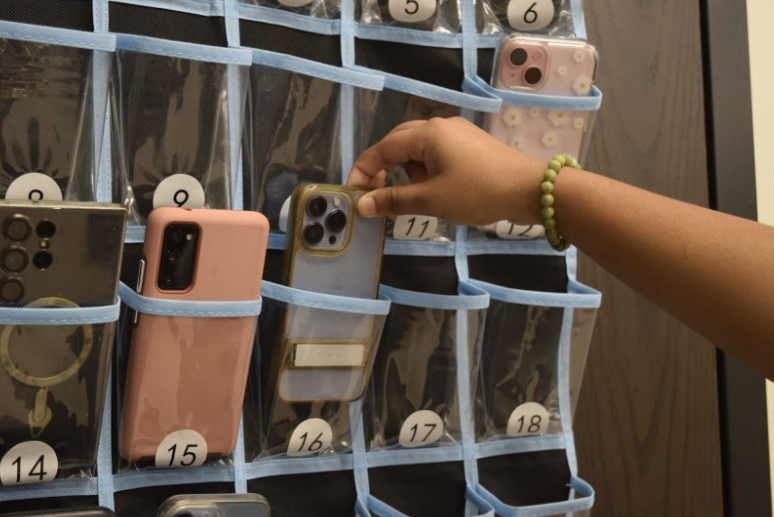In recent years, it has become a far too frequent sight that sporting events turn into two teams versus the officials. While these events are meant to be a safe and competitive environment for the student-athletes participating, the emotions in the heat of the game can cause the players, coaches and even parents to use poor judgment in their comments and actions, turning the game into a challenging experience for the referees.
According to a 2017 survey by the National Association of Sports Officials, adult behavior at sporting events is the reason more than 75% of all high school referees quit. The report also found that 80% of new officials stop after only two years.
“Umpires have been mistreated at games by parents and coaches and players,” varsity softball coach Jeff Chazen said. “I think there’s a lack of respect that they feel is out there and I tell my parents, ‘your job is to be a positive supporter for your athlete and apart of that being to not talk to the umpires at all.’ I’ve had to go into the stands once or twice to tell a parent to calm down.”
For some athletic programs, there has been a set mentality that the referees are out to blow the game for one team. Parents and coaches, in response to that, can hold officials in a low regard, setting an unprofessional example for players, creating more tension when there is a questionable call.
“[The] majority of the time when the officials make a questionable call, I try to be pretty calm,” varsity football coach Jeff Duncan said. “I feel in the intense atmosphere of a game, we are all pretty emotional, which is okay, but it’s got to be short. I have to set an example for my players, and I expect them to also hold their composure; I set the same expectations for myself.”
The issue of arguing calls has become so prominent to the point where after every call a referee makes, you will almost always have someone with a counter-argument. Sophomore baseball player Michael Lolley has always had a strained relationship with officials.
“The issue is definitely with the coaches and players because if there’s ever a call that doesn’t go their way, whether it’s right or wrong, there’s gonna be someone that argues it,” Lolley said. “Those calls always interrupt somebody’s play and players get so caught up in the game and want them to be played the right way.”
In an effort to combat the problem, there have been multiple campaigns to recruit referees, but they have struggled because parents and spectators still lack respect towards the officials.
“I think we just need to keep educating the parents,” Duncan said. “[The] majority of them don’t realize there is a shortage of officials because it hasn’t gotten so bad to the point we have to cancel games. We also need to promote people to become officials and have parents still realize the comments they make have an effect on the referees.”
While more severe consequences should be enforced for spectators who misbehave, there will still be continued difficulty scheduling and playing games due to the shortage of officials.
“I feel playing on Thursday nights or even Saturdays can become a common theme moving forward,” Duncan said. “They told us that a lot of officials referee Friday and Saturday, so they are trying to have more games on Thursday nights. I know the players like to go home Friday night after a game, but at the end of the day, we still get to play.”
In response to the drought of referees, parents, coaches and players must keep their emotions in check and remember that the referees are officiating to the best of their ability. No matter how much you protest a call, it will not change the outcome of the game. While not all parents protest every call made, the sight of constant fighting at youth sporting events is nonetheless a very familiar scene. This is not only important for easier scheduling of games or setting better examples for students and athletes, but this is also about being kind to one another and realizing that the words we say in an emotional setting have a lasting impact.



![Senior Dhiya Prasanna examines a bottle of Tylenol. Prasanna has observed data in science labs and in real life. “[I] advise the public not to just look or search for information that supports your argument, but search for information that doesn't support it,” Prasanna said.](https://pwestpathfinder.com/wp-content/uploads/2025/10/DSC_0073-2-1200x800.jpg)
![Junior Fiona Dye lifts weights in Strength and Conditioning. Now that the Trump administration has instituted policies such as AI deregulation, tariffs and university funding freezes, women may have to work twice as hard to get half as far. "[Trump] wants America to be more divided; he wants to inspire hatred in people,” feminist club member and junior Clara Lazarini said.](https://pwestpathfinder.com/wp-content/uploads/2025/05/Flag.png)
![As the Trump administration cracks down on immigration, it scapegoats many immigrants for the United States’ plights, precipitating a possible genocide. Sophomore Annabella Whiteley moved from the United Kingdom when she was eight. “It’s pretty scary because I’m on a visa. When my visa expires next year, I’m not sure what’s going to happen, especially with [immigration] policies up in the air, so it is a concern for my family,” Whiteley said.](https://pwestpathfinder.com/wp-content/uploads/2025/05/DSC_0077-7copy.jpg)
![Shifting global trade, President Donald Trump’s tariffs are raising concerns about economic stability for the U.S. and other countries alike. “[The tariffs are] going to pose a distinct challenge to the U.S. economy and a challenge to the global economy on the whole because it's going to greatly upset who trades with who and where resources and products are going to come from,” social studies teacher Melvin Trotier said.](https://pwestpathfinder.com/wp-content/uploads/2025/05/MDB_3456-1200x800.jpg)



![Some of the most deadly instances of gun violence have occurred in schools, communities and other ‘safe spaces’ for students. These uncontrolled settings give way to the need for gun regulation, including background and mental health checks. “Gun control comes about with more laws, but there are a lot of guns out there that people could obtain illegally. What is a solution that would get the illegal guns off the street? We have yet to find [one],” social studies teacher Nancy Sachtlaben said.](https://pwestpathfinder.com/wp-content/uploads/2025/01/DSC_5122-1200x800.jpg)


